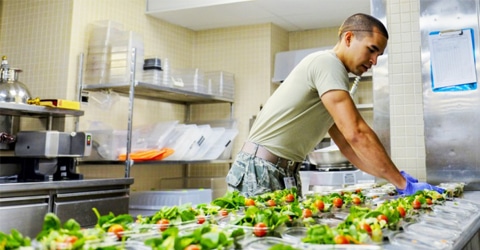
As I write these words, I am sitting in a fold-out chair, at a plywood desk, in the middle of the desert. My internet access comes and goes, and I wear my uniform more than anything else. Even in these circumstances, choosing to be plant-based is possible. Us healthy, plant-eating folk are resourceful and can be found where you’d least expect us to be. We come from all walks of life and work in just about every career field. We’re flight attendants, firefighters, and yes, we’re even members of the Armed Forces.
Eating Plant-Based Can Be Done!
Like most employers, the military is in the business of getting the most out of its investment. Over the course of your career, the Department of Defense will have invested hundreds of thousands of dollars into you and your training. Simply put, the military will be expecting a good return on investment, so you can rest assured: whenever healthy food can be provided, it will be. Unhealthy foods abound in the military because, after all, these foods offer calories to people who truly need them. The good news, though, is a wide variety of less-processed foods will also be found in abundance in most locations.
Surviving Boot Camp and Training
As you sit down to your first meal, you’ll discover that eating a plant-based diet during basic training isn’t all that different from before. You’ll just have less variety than you’re used to. The military has made it a point to emphasize health and fitness, so regardless of where you’re stationed, you’ll likely encounter colorful salad bars, fresh fruit, whole grains, and nuts and seeds. Boot camp is no exception to this standard rule. If you start missing particular foods or observe new cravings, just remind yourself that it’s boot camp and everybody will be missing something during training.
Here are some examples of typical plant-based foods you will encounter at boot camp:
Breakfast: Cereal, granola, packets of oatmeal and grits, peanut butter, jelly, fresh fruit, and juice
Lunch: Salad bar, cooked beans, Saltine crackers, bread, fat-free dressings, peanut butter, jelly, fresh fruit, and juice
Dinner: Steamed vegetables, pasta and/or rice, lunchtime items, fresh fruit, and juice
Overall, you’ll find the food quality to be pretty decent, and after completing push-ups and jumping jacks first thing in the morning, a big bowl of oatmeal and peanut butter will sound wonderful.
Once you graduate boot camp and head over to specialty training for your specific job, you’ll experience a bit more freedom and, in most situations, you will have on-base grocery stores and restaurants available to you during free time.
Daily Life in the Military
After your training is complete, no one will care where you eat your meals or where you do your grocery shopping. If you wind up getting stationed overseas, the base grocery stores (known as commissaries) will give you the opportunity to buy familiar American foods while living in foreign countries. Most importantly, you’ll have access to fresh fruits and vegetables, both on and off base.
All of the items found within an MRE will note the ingredients, so I suggest reading through and trading your not-so-plant-based items with other people
These days, base shops and commissaries do an excellent job at stocking healthy, plant-based products. When something isn’t available, you’ll even have the option to place specialty orders. While exploring new bases, I’ve managed to find items like tahini, Dr. McDougall’s Right Foods ramen noodles, and countless oil-free and freeze-dried snacks.
Surviving Deployments
Deploying is an inevitable reality for most of us service members. You could end up on a Pacific-Ocean-bound aircraft carrier or, like myself, in the middle of nowhere. In these situations, the most important advice I can offer is this: stay in touch with your priorities and be resourceful. As I said before, everyone in the military will be missing something during these stressful times — not just us plant-based eaters.
Deploying to Sea:
- Stock up on snacks before your deployment.
- Buy packaged food online and send it to your ship while underway.
- Restock food when you pull into foreign ports.
The cafeterias aboard ships (called galleys) are admittedly not the best. The vegetables aren’t exactly fresh, and the prepared foods come from cans and cartons. Whole, plant foods are simply scarce while out to sea. It may be wise to bring energy bars and powdered supplements to ensure you’re meeting your adequate nutrient intakes every day. Also keep in mind that time spent in the sunlight is limited aboard ships, so it’s important to take a vitamin D supplement with you on deployment.
Deploying to Combat Zones:
Forward operating bases (FOBs) vary in size but will always have some form of dining facility with fresh produce available. You can usually find healthy snacks in the base shops, as well. Your job may, however, require you to head outside the wire. This is where MREs, or Meals Ready to Eat, come into play. Believe it or not, a few of these packaged meals are vegetarian. All of the items found within an MRE will note the ingredients, so I suggest reading through and trading your not-so-plant-based items with other people.
Staying Motivated
It can be easy to feel deterred when our brains conjure up theories about the unforeseeable future. After all, there are a million what-ifs and a million obstacles that very well could be encountered while eating plant-based. As much as we try to convince ourselves that the future is exactly how we imagine it to be, the truth is, we have no idea what will come of it. All we can really do is be open to change and accept when things don’t turn out how we envisioned them.
No doubt, obstacles will be encountered in the military. Most people you meet will have eating habits that are worlds away from your own. You’ll encounter your fair share of less-than-ideal meals and plenty of uncertainty along the way. These physical obstacles will be challenging but can indeed be overcome. The biggest obstacle you will face, however, is not physical; it’s your own brain. It’s your brain that will convince you that sticking to a whole food, plant-based diet is too tough, or that you deserve to eat the cheese pizza with the rest of your unit. When these thoughts arise (and you can bet they will), I challenge you to dig a little deeper. Eating plant-based is very much possible in almost every situation in the military. You can focus on the obstacles that await you, or you can go out, be resourceful, make like-minded friends, and stick to the foods that serve your body best.
Image Credit: U.S. Air Force photo by Airman 1st Class Nathan Byrnes
You Might Also Like
Copyright 2026 Center for Nutrition Studies. All rights reserved.
Deepen Your Knowledge With Our
Plant-Based Nutrition
Certificate
Plant-Based Nutrition Certificate
- 23,000+ students
- 100% online, learn at your own pace
- No prerequisites
- Continuing education credits








